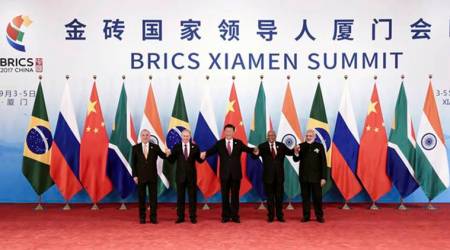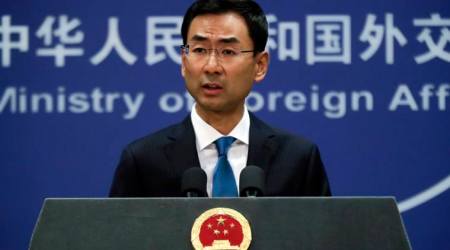 Chinese President Xi Jinping (C) delivers the speech ahead of the signing ceremony of BRICS Business Council at 2017 BRICS Summit in Xiamen, Fujian province, China September 4, 2017. REUTERS/Kenzaburo Fukuhara/Pool TPX IMAGES OF THE DAY
Chinese President Xi Jinping (C) delivers the speech ahead of the signing ceremony of BRICS Business Council at 2017 BRICS Summit in Xiamen, Fujian province, China September 4, 2017. REUTERS/Kenzaburo Fukuhara/Pool TPX IMAGES OF THE DAY
In a significant move forward from the Goa BRICS declaration, Beijing has signed off on New Delhi’s initiative to name two Pakistan-based terrorist groups, Lashkar-e-Taiba and Jaish-e-Mohammad, in the Xiamen declaration, expressing “concern” on the security situation in the region and violence caused by these outfits. This is the first time that a BRICS declaration has named these terrorist groups, although the Heart of Asia declaration in Amritsar, a grouping which includes China and Pakistan, also named them in December 2016. But there has been no visible change in China’s policy on the ground so far.
Along with the Haqqani network, Taliban and Islamic State, the Xiamen declaration Monday also named the Eastern Turkistan Islamic Movement, a Muslim separatist group founded by militant Uighurs, members of the Turkic-speaking ethnic group in northwest China’s Xinjiang province.
“We, in this regard, express concern on the security situation in the region and violence caused by the Taliban, ISIL/DAISH, Al-Qaida and its affiliates including Eastern Turkistan Islamic Movement, Islamic Movement of Uzbekistan, the Haqqani network, Lashkar-e-Taiba, Jaish-e-Mohammad, TTP and Hizb ut-Tahrir,” the 48th paragraph in the 71-paragraph declaration said.
From India’s perspective, naming LeT and JeM are symbolic takeaways, since China has in the recent past blocked the designation of Jaish-e-Mohammad chief Maulana Masood Azhar as a global terrorist at the United Nations Security Council. Beijing has repeatedly blocked New Delhi’s move — as well as those by US, UK and France — to list Azhar on technical grounds.
Asked whether the Xiamen declaration means that China has changed its position on Azhar’s listing, Preeti Saran, Secretary (East) in the Ministry of External Affairs) and one of India’s lead negotiators for the Xiamen declaration, said: “You have to ask the Chinese about that.”
Despite the approach adopted by Beijing in the past, Indian officials perceived this as a major takeaway, especially since it comes after a tense border standoff at Doklam.
Indian officials said that not just Prime Minister Narendra Modi, but other BRICS leaders also condemned terrorism in all forms and manifestations, during “restricted talks”. According to Saran, “all the leaders mentioned it”, since all the BRICS countries have been victims of terrorism.
“Terror is a scourge, and increasingly there is a realisation that you cannot have double standards when dealing with this menace. There are no good or bad terrorists,” she said, referring to the oft-repeated Indian stand on cracking down on terrorist groups and their activities emanating from Pakistan.
The Xiamen declaration also deplored all terrorist attacks worldwide, including attacks in BRICS countries, and condemned terrorism in all its forms and manifestations wherever committed, by whomsoever. It underlined that there could be no justification whatsoever for any act of terrorism. “We reaffirm that those responsible for committing, organizing, or supporting terrorist acts must be held accountable,” it said.
Recalling the primary leading role and responsibility of states in preventing and countering terrorism, it also stressed on the necessity to develop international cooperation, in accordance with the principles of international law, including that of “sovereign equality of states and non-interference in their internal affairs”.
“We recall the responsibility of all States to prevent financing of terrorist networks and terrorist actions from their territories,” it said, and called for expeditious finalisation and adoption of the Comprehensive Convention on International Terrorism (CCIT) by the United Nations General Assembly.
Incidentally, there was no statement from Prime Minister Modi condemning Pakistan at the plenary session, unlike the last BRICS summit in Goa in October last year where he had referred to Pakistan as “the mothership” of terrorism and said “terrorism has become its favourite child”.
Sources said that Modi raised the issue of terrorism at the restricted talks between the leaders, but refrained from mentioning the issue at the plenary. “It was a considered decision,” an Indian official said.
Officials said that negotiations for the BRICS document had been on for some weeks, and the Chinese side had come “on board”.
In Beijing, while defending the move to include these terror groups for the first time in the BRICS joint declaration, Chinese Foreign Ministry spokesman Geng Shuang said BRICS countries have “shown their concerns to the violent activities raised by these organisations”.
“These organisations are all sanctioned by the UN Security Council and have a significant impact for Afghanistan issue,” Geng told PTI in a written response. He did not, however, give a direct response to a question on whether the naming of Jaish-e-Mohammad by the BRICS marks a change in Beijing’s stand of opposing the UN ban against Masood Azhar.
“On counter-terrorism cooperation among BRICS countries, we are very satisfied with the achievements made by the BRICS. We have a working group on terrorism,” he said. There was no immediate response from Pakistan. Indian officials said they would expect Islamabad to come out with a generic condemnation of terrorist groups in the next few days.

